
If you’ve ever wondered about the meanings and signs of seeing a crow, you’re not the only one. Certainly seeing a crow isn’t an unusual occurrence for most people. Crows are everywhere. They live on every continent on Earth except Antarctica. They’re very adaptable, able to live in the wilderness and urban areas alike. Yet as familiar as they are, something about these smart, social, dramatic-looking birds seems to inspire us to ascribe some meaning to their appearance and behavior. Myths and legends from all around the world explore the nature of the crow and try to glean significance from them. So if a crow seems to want your attention, it may be wise to heed the caw.
The Science of Crows
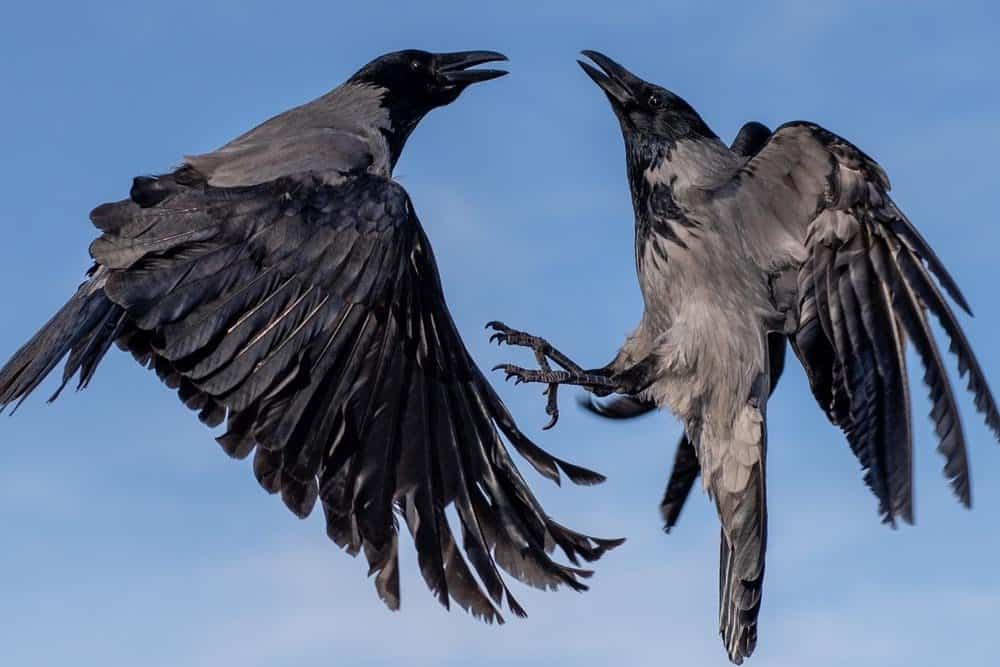
Birds of a feather, crows are social creatures.
©Vladimir Turkenich/Shutterstock.com
First, the facts. There are 40 different crow species, all in the genus Corvus, along with their close relatives the ravens and rooks. Scientifically speaking, crows are dang fascinating birds. For one thing, crows are smart. Scary smart. So smart that they can tell humans apart by remembering their faces, and can signal to each other that a particular human is a threat. (Which kind of casts doubts on the whole scarecrow concept tbh.) They’re good at problem-solving and can learn to use tools. Some species are social and can roost in huge numbers, sometimes in the thousands. They communicate with at least 250 distinct calls. Fortunately, most species of crow are not endangered. A world without crows would be a poorer one, wouldn’t it?
Now that you’re in the know about the crow, let’s consider what this remarkable bird has to tell you and examine the possible meanings of seeing a crow.
A Crow Can Be a Symbol of Death
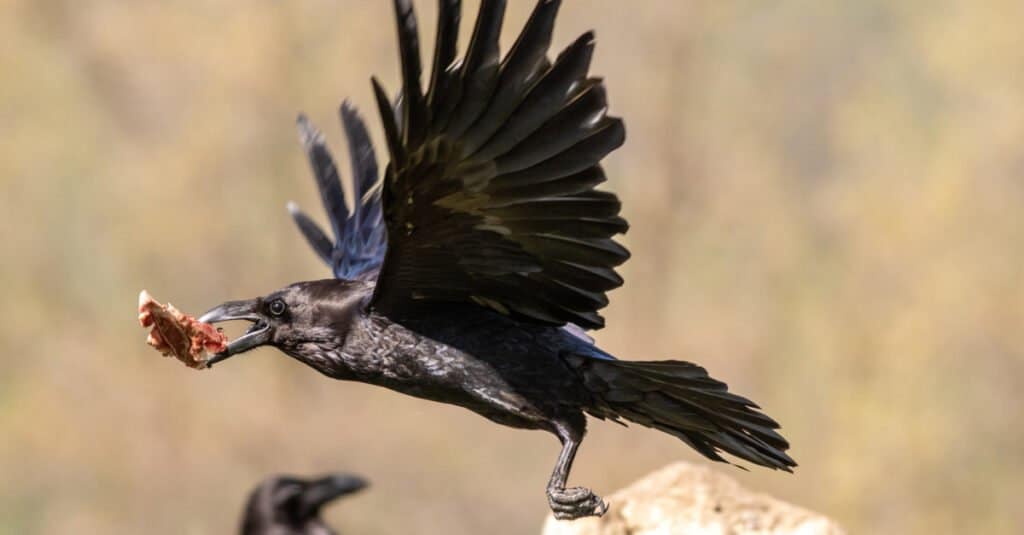
A crow’s habit of eating carrion has made crows a sign of ill omen.
©Francisco Palomares/Shutterstock.com
There’s no getting around it: crows, and their larger relatives the ravens, have a strong association with death and ill fortune. Their all-black apparel probably has a lot to do with this. And it doesn’t help that crows are carrion eaters. That’s not all they eat; in fact, crows are wildly omnivorous. They’ll chow down on everything from frogs and snakes to grain, eggs, and human garbage. But large black birds swooping in to feast on a newly-dead animal…well, that’s bound to make an impression.
One example of this association is the Celtic goddess of war and death, the Morrigan. She was believed to appear as a crow called “Badb Catha,” meaning “battle crow,” foreshadowing death and bloodshed.
But if you’re a believer in omens, don’t panic if a crow turns up at your window. In some divination systems, death is a symbol of change, or of something ending in your life, rather than a literal demise. Or it could be there’s a dead squirrel in your yard!
A Crow Can Represent Messages or Communication
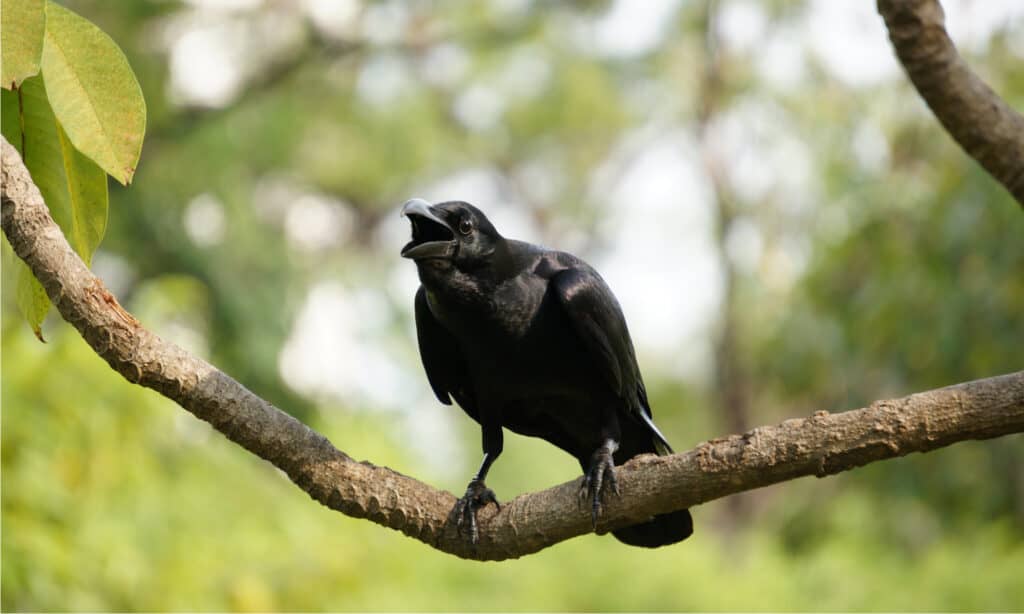
Urgent message: Crows are great communicators, meaning they can warn each other that you’re coming.
©Tomorrow36/Shutterstock.com
Crows are communicative birds, capable of using hundreds of different calls to signal to each other. Different populations even have different “accents” for their vocalizations. So crows are good candidates to play the role of message bearers. The ancient Greeks associated crows with the prophecies of Apollo. In one story, a crow brought unwelcome news to the god, who turned the formerly-white bird black in his anger. Perhaps a crow is urging you to pay closer attention to what somebody in your life is trying to tell you. Or urging you to answer your emails.
A Crow Can Symbolize Family or Community Connections

Crows are social, meaning if you see one, there are probably others nearby.
©Tiffany Sims/Shutterstock.com
For many crow species, being part of a community is a matter of survival. Crows signal to each other about impending danger, and even mob and chase predators away. And then there’s the phenomenon of the crow funeral: a group of crows will gather around the body of a dead crow, seeming to keep vigil over it. This behavior is actually a way for the group to assess the threat that may have killed one of their numbers. They may consequently avoid the area where the dead bird was found.
Close family ties are also important to crows. These birds mate for life. And juvenile crows will help their parents repel predators, keep the nest clean, and bring food for younger siblings. Have you been neglecting a familial or social connection in your life? If a crow can understand the importance of community, we should too.
Crows Can Signify Intelligence, Creativity, and Enlightenment
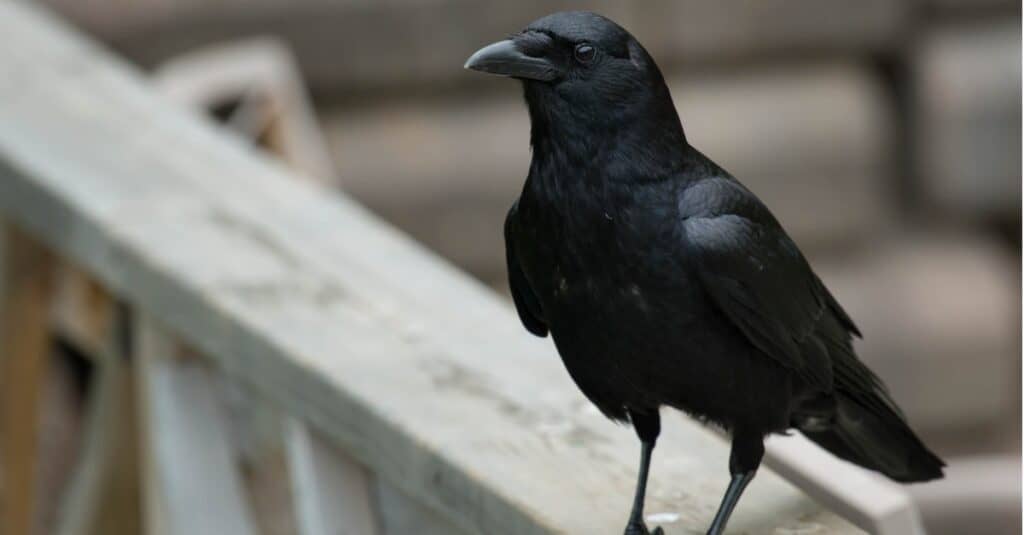
Looking for trouble? Many myths and folktales focus on the crow’s cheeky cleverness.
©iStock.com/PaulReevesPhotography
Crows in Japan have been known to turn faucets so they can drink from public fountains. In Australia, crows use sticks to pull ants out of their nests (to eat them). One study found that crows figured out how to use small sticks, too small for the anthills, to reach the sticks that were long enough to get those tasty ants. In another study, crows figured out that they could drop objects in water to raise the water level and bring food within their bills’ reach. Crows are crafty, too, capable of distracting other animals to steal their food or following predators to swipe their prey. So it’s no surprise that many myths portray crows as smart, clever, or knowledgeable.
Many Native American traditions place crows in creation stories or credit them with bringing fire to mankind. Hindu texts relate the story of Kakabhushundi, a sage who is cursed with the form of a crow, then chooses to stay that way in devotion to the god Rama. In Tibetan Buddhism, the crow is associated with the deity Mahakala, a temple guardian who removes obstacles to spiritual advancement.
All of this suggests that seeing a crow can be an opportunity to consider a different approach to a problem that’s vexing you. Maybe it’s time to think outside the box. Or find a longer stick.
What Does a Crow Symbolize in Native American Culture?
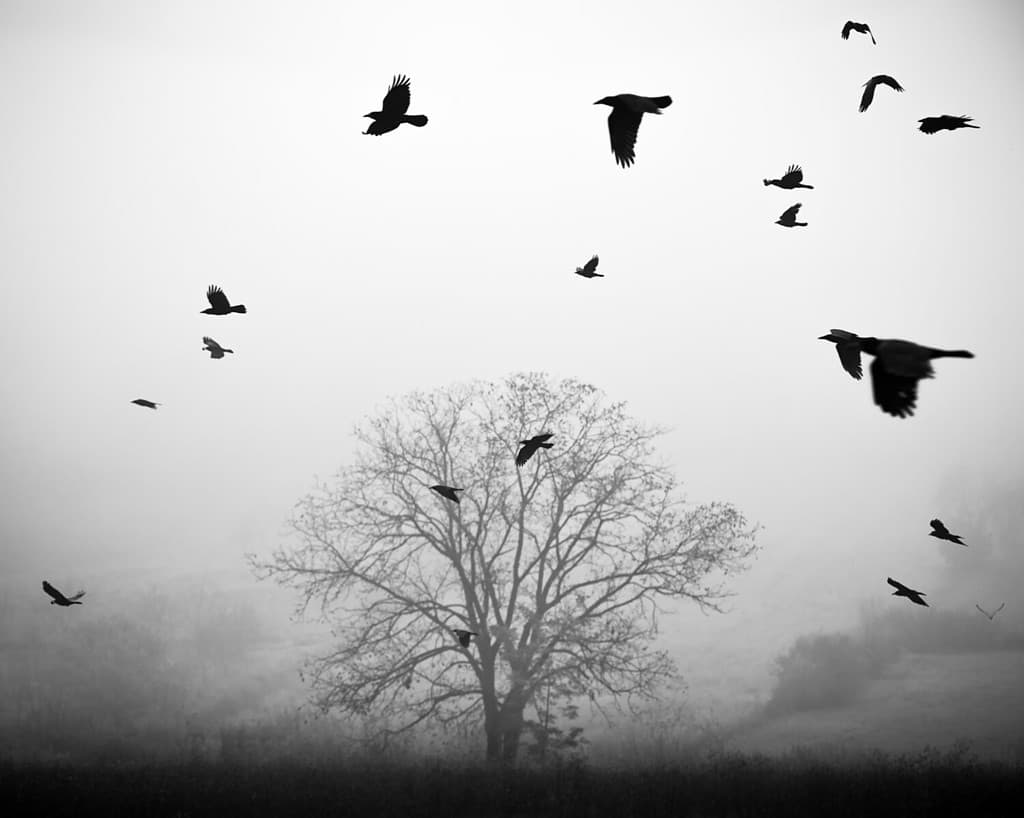
Crows were known as both intelligent fire-bringers and mischief-makers in Native American lore.
©Belmin Mesanovic/Shutterstock.com
While we touched on how some Native American cultures believe the crow brought fire to humans, this just reinforces one line of thinking of how the bird represents intelligence. With that being said, it was also found to take the form of a trickster in which the crow would play practical jokes and engage in wild stories of mischief. Contrary to what many people may assume because the are carrion eaters, crows were hardly ever depicted as brings or death in Native American culture.
Because the crow was seen as such a wise and intelligent animal, many Native American tribes held the crow as one of their totems or clan animals. Just a few tribes to portray the crow as such were the Hopi, the Chippewa, the Caddo, the Menominee, and some of the Pueblo tribes. How is that for being popular?
The photo featured at the top of this post is © Bruce A Clifton/Shutterstock.com
Thank you for reading! Have some feedback for us? Contact the AZ Animals editorial team.






